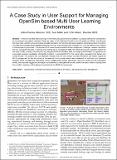A case study in user support for managing OpenSim based multi user learning environments
Abstract
Immersive 3D Multi User Learning Environments (MULE) have shown sufficient success to warrant their consideration as a mainstream educational paradigm. These are based on 3D Multi User Virtual Environment platforms (MUVE), and although they have been used for various innovative educational projects their complex permission systems and large numbers of functions can make their management potentially challenging. It follows that an inadequately managed MULE can be ineffective with respect to intended learning outcomes. The purpose of this research was to determine how management challenges manifest themselves and how to support educators in learning and applying MULE management skills. We utilized the popular OpenSim platform for this study. First, a survey of the need for user support (N=43) is described. Next, the design and evaluation of a guidance tool using graph topologic visualization of OpenSim functions is presented (N=211). The tool is further evaluated in the delivery of a course module. The analysis and user feedback indicated that the tool provides accurate information and helpful support for MULE management. As the final phase of the research, training environments were developed for both basic and advanced OpenSim MULE management. Evaluations of their usability and perceived educational value were carried out with participants (N=68); the outcomes suggest that training for advanced MULE management is more useful for all users, without requiring more time or effort, regardless of the degree of complexity of the MULE being designed.
Citation
Perera , G I U S , Miller , A H D & Allison , C 2017 , ' A case study in user support for managing OpenSim based multi user learning environments ' , IEEE Transactions on Learning Technologies , vol. 10 , no. 3 , pp. 342-354 . https://doi.org/10.1109/TLT.2016.2632126
Publication
IEEE Transactions on Learning Technologies
Status
Peer reviewed
ISSN
1939-1382Type
Journal article
Description
This research was supported by the Commonwealth Scholarship Programme (UK) and the Scottish Informatics and Computer Science Alliance (SICSA).Collections
Items in the St Andrews Research Repository are protected by copyright, with all rights reserved, unless otherwise indicated.

